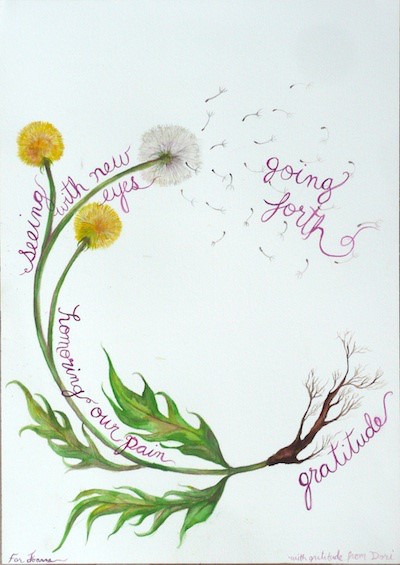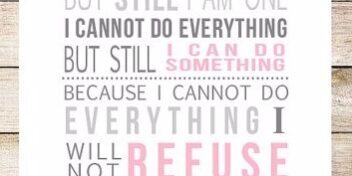How can our mindfulness skills help to resource us for making positive change in the world?
There may be many things happening today in our world that feel deeply concerning and huge at the same time. These might include climate change, social and political injustice, poverty, animal welfare issues… topics with no easy answers, no quick fixes, no one-person solutions possible. So what good would it do for us to think about or get involved with these things and get overwhelmed/depressed/anxious/angry, when it can feel like I can’t make much difference anyway?
Fair enough question. But… in this deeply interconnected world, not looking and not acting is not a recipe for happiness either. So as we are practising mindfulness for the benefit of ourselves and others, and it’s worth looking at how we might apply the same principles we use in personal practice to relating to these bigger issues.
In the compassion training of the Mindfulness Association we work with the definition of compassion the Dalai Lama has given us:
“compassion is a sensitivity to suffering in self and others, with a strong commitment to try to relieve it.”
So if we want to grow our compassion and find a way to actively contribute to creating the world we’d like to live in, it might require a deliberate turning towards those difficult subjects – becoming more rather than less sensitive to them. But it’s important to first cultivate our inner resources so that we’re ready to ‘face the mess we’re in’, and the practice of gratefulness is a very powerful way to do this.
Not only does gratitude give rise to good feelings, but it deeply connects us to what we love and therefore want to protect. This love and interconnectedness might be the most powerful motivation to move out beyond our comfort zone – to deeply feel and even honour the pain for our world that we are part of. In the words of Frederick Beuchner, we’re called to ‘the place where your deep gladness and the world’s deep hunger meet’. And finding this place requires a willingness, an openness and (re)connecting with both our love and concern for the world.
So with this increased sensitivity to the suffering in ourselves and others (ranging from our loved ones to other human beings who may live in a different part of the world or look different from us, have different values or beliefs, as well as animals or even ecosystems), we may again need resourcing to see what the ‘strong commitment to try to relieve it’ might look like. Connecting with empowering and inspiring perspectives of interconnection and bigger picture can grow the commitment to come into action, starting right where we are. No need to save the world alone, but ‘though I am only one person, I can be one person who makes a difference’.
 This spiral of gratitude, honouring the pain for the world, seeing with new eyes and going forth, is one that we can move through again and again in small and big ways, as we practice engaging with the world. It’s a tried and tested pathway from the Work That Reconnects which was brought into the world by Buddhist scholar and environmental activist Joanna Macy. The spiral can be a helpful container for meeting these big topics in a way that turns a ubiquitous worry into powerful compassionate action, an ‘outer practice’ which is a seamless extension from our practice of mindfulness and compassion on the cushion.
This spiral of gratitude, honouring the pain for the world, seeing with new eyes and going forth, is one that we can move through again and again in small and big ways, as we practice engaging with the world. It’s a tried and tested pathway from the Work That Reconnects which was brought into the world by Buddhist scholar and environmental activist Joanna Macy. The spiral can be a helpful container for meeting these big topics in a way that turns a ubiquitous worry into powerful compassionate action, an ‘outer practice’ which is a seamless extension from our practice of mindfulness and compassion on the cushion.
The term ‘engaged mindfulness’ is derived from ‘Engaged Buddhism’, which refers to Buddhists who are seeking ways to apply the insights from meditation practice and dharma teachings to situations of social, political, environmental, and economic suffering and injustice. This movement within Buddhism was started by Thich Nhat Hanh in 1963, at a time when his country was ravaged by the Vietnam War. Both the current Dalai Lama and the 17th Karmapa have voiced a need for Buddhists to be more involved in the social, political and environmental realm.
There are many ways to practice engaged mindfulness. The Mindfulness Association offers a weekend course on this topic in Samye Ling on 26-28 January. For more info, please click here.
-Kristine Mackenzie Janson
To visit our website: please click here
To join our membership: please click here
Follow us on YouTube: please click here
Follow us on Facebook: please click here
Follow us on Instagram: please click here


